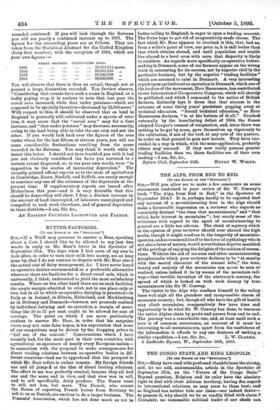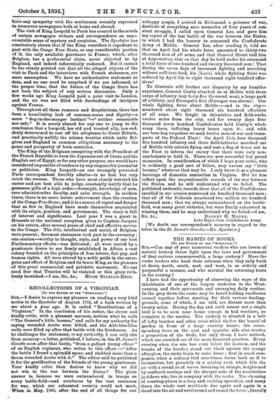THE CONGO STATE AND KING LEOPOLa
[To THE EDITOR OF IRE " BPRCTATOR,n SIR,—Many have read with profound thankfulness the strong;. and, let me add, statesmanlike, article in the Spectator or September 28th, on the "Future of the Congo State.' Beyond question, Belgium and its ruler have the absolute- right to deal with their African territory, having due zegar& to international relations, as may seem to them best; and' as England has neither title nor claim—nor indeed desire— to possess it, why should we be so readily filled with alarm? Certainly, no responsible political leader of any shade can
bave any sympathy with the sentiments recently expressed in numerous newspapers both at home and abroad.
The visit of King Leopold to Paris has created in the minds of certain newspaper writers and correspondents an unac- countable sense of mystery and suspicion. The Spectator has conclusively shown that if the King considers it expedient to part with the Congo Free State, or any considerable portion of it, the only available purchaser is France, which, after Belgium, has a preferential claim, never objected to by England, and indeed inferentially endorsed. But it cannot he too clearly pointed out that all the alleged objects of the -visit to Paris and the interviews with French statesmen, are mere assumption We have no authoritative statement or -data, and no one need be surprised if we are informed, at the proper time, that the future of the Congo State has not been the subject of any serious discussion. Only a few weeks ago King Leopold paid a quiet visit to London, -and the air was not filled with forebodings of intrigues -against France.
Throughout all these rumours and disquisitions, there has -been a humiliating lack of common-sense and dignity—a mere "dog-in-the-manger instinct "—" neither reasonable nor safe." It is surely absurd for any one to jump to the -conclusion that a Leopold, her old and trusted ally, has sad. -denly determined to cast off his allegiance to Great Britain, and practically nullify the solemn treaties which unite Bel- gium and England in common obligations necessary to the peace and prosperity of both countries.
The King of the Belgians conspiring with the President of the French Republic to turn the Japanese out of Corea and the English out of Egypt, or for any other purpose, one would have -considered impossible of credence by any responsible journalist or politician. King Leopold—as one strangely perverted Paris correspondent forcibly admits—is no fool, but very -much the reverse. Those who have most closely watched his -career and are best able to judge, constantly testify that he .possesses gifts of a high order,—foresight, knowledge of men, are administrative faculty, and calm strength. In modern times, there is no more heroic achievement than the creation -of the Congo Free State; and it is a source of regret and danger that so few in England have made themselves acquainted with its origin, position, and government. The story is full -of interest and significance. Last year I was a guest in Brussels at the national reception given to Captain Jacques -on his return, after several years of chief and effective service in the Congo. The elite, intellectual and social, of Belgium were present ; foremost statesmen took part in the ceremony ; -one oration—worthy in thought, style, and power of our best Parliamentary efforts—was delivered ; all were moved by a passionate desire to see firmly established in Africa a vast -colony founded on the principles of free labour, fair pay, and human rights. All were stirred by a noble pride in the enter- prise and effort of Belgium and its brave King, as the pioneers -of this great commercial and patriotic movement. No one -need fear that Treaties will be violated or this glory ruth- lessly tarnished.—I am, Sir, &C., HUGH GILZEAN-REID.







































 Previous page
Previous page